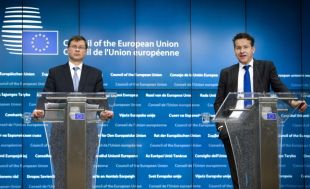
All rights reserved.
You may not copy, reproduce, republish, or otherwise use www.baltic-course.com content
in any way except for your own personal, non-commercial use.
Any other use of content requires the hyperlink to www.baltic-course.com.

Printed: 10.05.2024.
 PrintEuropean semester: further coordination for growth
PrintEuropean semester: further coordination for growth
 |
|---|
The EU’s approach to creating new economic progress is built on the 3-way approach. This means boosting investment, pursuing structural reforms to modernise member states’ economies and continuing fiscally-responsible policies.
EU-28 economic ministers agreed on the idea to publish the euro recommendation earlier than in the past so that Member States can take them into account as they shape their national policies.
Member states’ ministers have
decided to include one additional euro-area recommendation on the commitment to
work on EMU deepening.
Hence, there is a strong political will to work on strengthening the fundamentals of the currency union, despite the existing challenges.
Completing the banking union
One of the important elements of the work on EMU deepening is completing the Banking Union.
Just before the end of last year, all Member States had ratified the Inter-Governmental Agreement on the Single Resolution Fund, which is now fully operational. The Single Resolution Board, in cooperation with the national resolution authorities, now has all the powers to deal with failing banks.
However, the problem still remains: some EU states have not yet fully implemented the Bank Recovery and Resolution Directive and the Deposit Guarantee Scheme.
In the beginning of January, EU-28economic/finances ministers also agreed on the mandate to start discussions on the Commission's proposals to complete the Banking Union, including the European Deposit Insurance Scheme.
As to the fight against terrorism financing, since December ECOFIN meeting (when the Commission set out the issues to combat the financing of terrorism), the work at technical level has substantially advanced. The Commission is aimed to present an Action Plan, setting out a series of measures, including legislative ones, ahead of the next Ecofin meeting in February.
In the meantime, the Commission called on EU member states to better use existing measures, e.g. improving assets freezes and implementation of the 4th Anti-Money Laundering Directive, coordination between Financial Intelligence Units and helping information to be shared better between Member States.
Tackling tax fraud
Finally, ECOFIN meeting discussed the question of VAT fraud. Each year, almost €170 billion of tax revenues are lost because of VAT fraud. At the same time, businesses face complex and inefficient VAT collection systems, especially when they go cross-border.
The Commission will address these issues in an Action Plan, which will be presented in March. It will set out ways to tackle VAT fraud, especially - but not only - on cross-border transactions. The Commission promised to look at the option of the reverse charge mechanism and other options to tackle tax fraud.
Reference: Remarks by Vice-President V. Dombrovskis after ECOFIN meeting; SPEECH/16/86; Brussels, 15 January 2016 in:
http://europa.eu/rapid/press-release_SPEECH-16-86_en.htm?locale=en